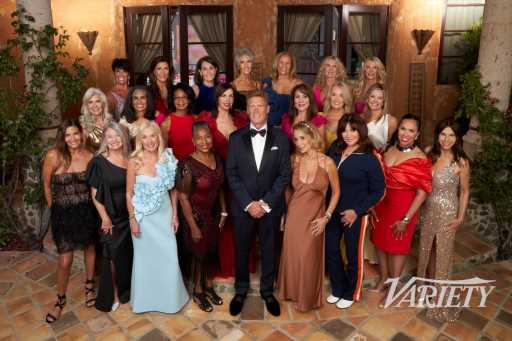
It’s 6:34 a.m., and the sun is rising as Gerry Turner hands out his final rose of the night. His bedtime came and went long ago. Giddy producers are watching him from a control room, 11 hours into an overnight shoot that’s not done yet.
Turner isn’t exactly a night owl. Typically at this time, the 72-year-old would just be waking up to fry some bacon and eggs. His day might then include a jog around the lake, or perhaps a game of pickleball.
But on a summer night at a mansion in the hills above Malibu, Calif., Turner has been speed-dating 22 women who’d arrived in limousines to meet him. His teenage granddaughters had helped him choose the perfect tuxedo, so he would look his best. After all, their grandpa was about to make his debut on “The Golden Bachelor,” the first-ever senior citizen dating show, in which 60 and 70-somethings compete to find love on television.
Earlier in the evening at 8 p.m., as the cameras were about to roll, host Jesse Palmer stood in position outside the “Bachelor” mansion where Variety was the only outlet behind-the-scenes for the first night of filming on the new series. Then something happened that even the best reality TV producers could not engineer — a shooting star flew across the sky.
“Did you see that? That was, like, an asteroid!” ABC executive Rob Mills shouted in amazement, looking up. “That must be a good omen.”

It’s been more than two decades since “The Bachelor” premiered, changing the course of unscripted television. The show has spawned numerous spinoffs, with 60 collective seasons having aired since 2002. While ratings for “The Bachelor” and “The Bachelorette” have weakened over the years, their impact hasn’t. No other dating series has been able to mimic its format effectively, and the “Bachelor” phenomenon has become entwined in the fabric of American pop culture.
With that popularity has come scandal. In 2021, longtime host Chris Harrison was ousted after making racially insensitive remarks. Earlier this year, “Bachelor” mastermind Mike Fleiss departed the franchise he created following an HR investigation into allegations of racial discrimination and bullying.
But now, ABC is looking to a widowed Midwestern retiree to save “The Bachelor,” and executives are thrilled by the level of excitement around “The Golden Bachelor’s” announcement in May — buzz that only increased when Turner was revealed to be the leading man in July.
“The reaction is bigger than anything we could have dreamed of,” says Mills, executive vice president, unscripted and alternative entertainment, Walt Disney Television, who has overseen the franchise since 2006. “Instinctually, we knew this had the opportunity to really touch a nerve, and become something bigger than even ‘The Bachelor.’”
Since Turner’s casting was announced, “The Golden Bachelor” has been everywhere. With more than 250 million online hits and press mentions, Turner’s reveal marks the most successful launch of any “Bachelor” — ever. When his cast of suitors were unveiled in August, the video drew 36 million views on social media in a matter of days.
“It’s a universal concept. We all want love, and this is a different way — we’ve never told a later-in-life love story,” Mills says. “It’s a long life, and a lot of people have these second acts.”
Turner’s story is the epitome of the second chance. A doting father with two daughters and two granddaughters, Turner lost the love of his life, his high school sweetheart, after 43 years when she died unexpectedly in 2017. “The Golden Bachelor” has been in development for more than four years, but ABC didn’t want to greenlight the show until it found the perfect man. Before landing on Turner, the casting team met a long list of candidates ranging from their 40s through their 70s.

Turner tells Variety he first applied well before the pandemic. “I was at a period where I wasn’t dating anyone,” he says. “I was feeling kind of down on my luck and I saw the ad, and I mentioned it to my daughters. They’re big fans of the show, and they got me watching the show and they said, ‘Dad, you should do it!’”
ABC is so bullish on “The Golden Bachelor” — especially during this strike-affected fall season — that it has created a night of back-to-back “Bachelor” programming, moving the franchise from Monday to Thursday. There, Turner’s journey will lead into the raunchier — and younger — fan favorite “Bachelor in Paradise.”
By capitalizing on the widespread excitement for Turner’s season, the hope is the “Bachelor” franchise as a whole will get a lift, both in ratings and in relevance.
“It is really important for this show to be at the forefront of pop culture,” Mills says. “It certainly shows in the ratings, and you feel it — when people aren’t talking about it, the ratings go down.”

The most recent season of “The Bachelorette,” which aired during the summer, ranked as Monday’s top broadcast entertainment series in total viewers and in the 18-49 demo. But with an average of 3.2 million viewers, it’s all relative. In the pre-streaming mid-2000s, the franchise brought in more than 10 million live viewers each night. And roughly 26 million people tuned in to see the first “Bachelorette,” Trista Sutter, get married on TV.
Now, for the first time in years, viewers have something completely new to tune in to.
“It definitely feels like we’re set up for a big year in Bachelor Nation,” Mills says. “This is a very special franchise that means a lot to people. When you give them stories to be invested in it, they come.”
Read More About:
Source: Read Full Article